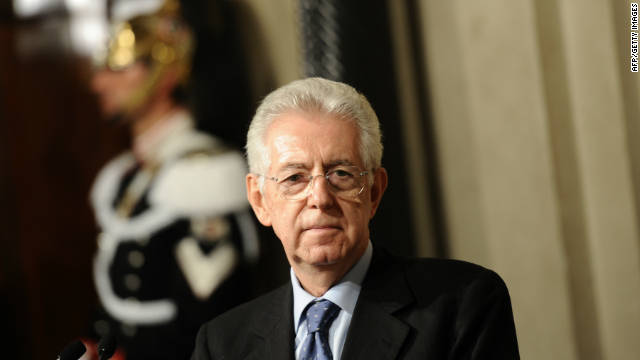Feed: CNN.com - WORLD
Posted on: Wednesday, November 16, 2011 7:49 PM
Author: CNN.com - WORLD
Subject: Monti officially becomes Italy's PM
Italy's Prime Minister-designate Mario Monti is presenting a government to the country's president for approval on Wednesday after two days of negotiations with leaders of the country's major political blocs. |
Monti takes Italy's top job, aiming to end crisis
- NEW: Mario Monti and his new ministers hold their first Cabinet meeting
- Italy's president says the new government's creation was "delicate, difficult"
- The new government includes Italy's first female interior and justice ministers
- Berlusconi resigned over the weekend in the face of a debt crisis
Rome (CNN) -- Mario Monti, the man tasked with hauling Italy out of the debt crisis that brought down Silvio Berlusconi, took office as prime minister Wednesday.
Monti announced he would also be finance minister, at least temporarily.
He replaces the flamboyant Berlusconi, who led the country on and off for 18 years.
Monti and his new ministers sat down for their first Cabinet meeting Wednesday evening, as they seek to find a way out of a crisis that has shaken the confidence of global investors.
The new prime minister will present his government's plans to the Italian Senate on Thursday.
Debate on the proposals will be followed by a vote of confidence, a measure to see if the new government has the support of a majority of lawmakers.
Monti took the oath of office Wednesday afternoon in the grand Baroque Ball Room of the Quirinale Palace, the official residence of President Giorgio Napolitano.
The government lineup the new prime minister unveiled will be composed entirely of technocrats, without career politicians.
That will make it easier to govern and will help calm political tensions in the country, Monti said.
It also emphasizes "that we are talking about an extraordinary moment, both because of the economic difficulties and because of the exasperated relations among the political forces," he said.
Napolitano said he believes the new government "has been born in a positive climate." Its creation has "been delicate and difficult ... but I think we've all managed to do it," he said.
Italy has already seen "many positive signals" from the European Union as a result, he added.
The 68-year-old former European Union commissioner won the backing of Berlusconi's political party and Italy's largest left-wing party on Tuesday.
Monti said it is "very interesting and very demanding" to try to form a government.
His government will include three women as ministers, including Anna Maria Cancellieri, the first woman to be Italy's interior minister, and Paola Severino, who will be the country's first female justice minister.
The foreign minister will be Giulio Terzi Sant'Agata, while Corrado Passera becomes minister of industry.
Monti said he will serve as finance minister until he nominates someone else for the post.
The new prime minister refused to answer journalists' questions about pension reform or taxes on wealth, saying he would present his plans to lawmakers Thursday.
Monti faces an arduous task, because Italy has one of the highest national debts in Europe at â'¬1.9 trillion ($2.6 trillion) -- about 120% of GDP -- and has seen low growth in recent years.
He suggested Monday that his government might not last much longer than a year, until scheduled elections in early 2013. And at any time, Parliament could dissolve his government "because of lack of trust," he said.
It is "obvious" that the task at hand is an emergency and that to achieve economic growth and social equity "should be the priorities," Monti said.
Berlusconi resigned Saturday night, prompting cheers, flag-waving and singing in celebrations outside his office and ending an era in Italian politics. He was brought down by difficulties in pushing through budget cuts after 18 years in and out of the prime minister's office.
Berlusconi is expected to give his first speech as a lawmaker in the lower house of Parliament on Friday, according to Italian media reports.
His People of Freedom party remains the strongest force in Parliament, and Berlusconi has said he plans to remain active in it.
Berlusconi is the second prime minister to resign this month over the debt crisis sweeping across Europe, following last week's replacement of Greece's George Papandreou. Papandreou was replaced by Lucas Papademos, a former European Central Bank official.
Loading weather data ...


















No comments:
Post a Comment